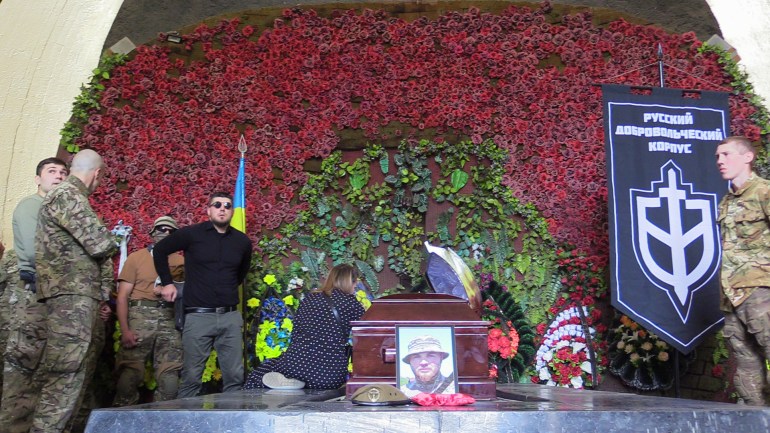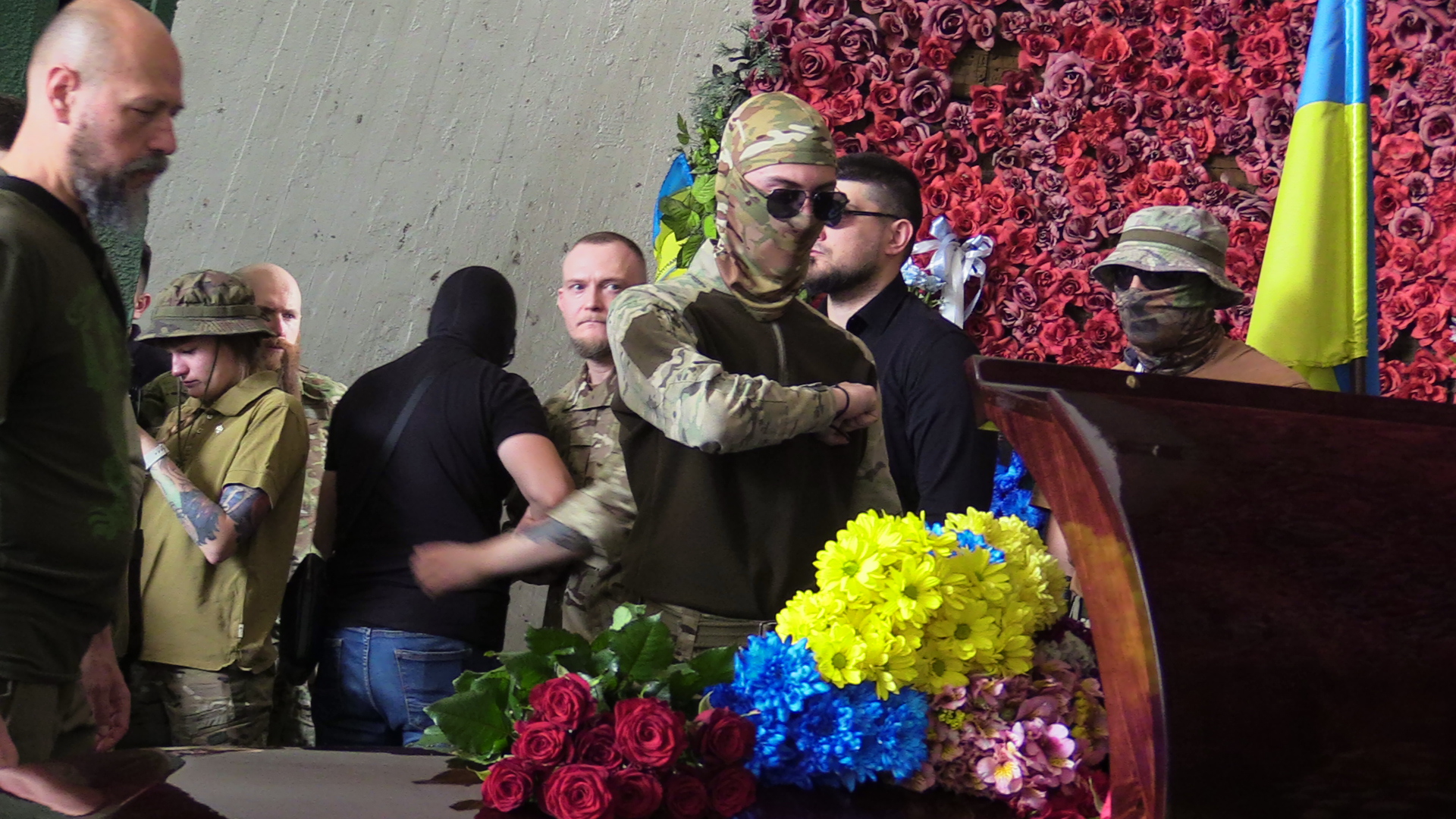Kyiv, Ukraine – Standing subsequent to the coffin with the physique of Daniil Maznik, lots of his camouflage-clad, battle-tested brothers-in-arms wept.
“He was a courageous warrior, a pious Christian, a reliable comrade,” Denis Kapustin, Maznik’s commanding officer, mentioned via tears throughout a farewell ceremony final weekend on the historic Baikove cemetery in Kyiv.
Maznik, a bearded and burly 29-year-old, was killed throughout one in all probably the most audacious and brazen navy operations of the persevering with Russia-Ukraine struggle.
On June 1, he was a part of 4 small navy models that crossed into the western Russian area of Belgorod to assault Shebekino, a metropolis of 40,000, and seize the village of Novaya Tavolzhanka.
They clashed with border guards and servicemen and have been backed by Ukrainian drone assaults and heavy, indiscriminate artillery hearth that included banned cluster munitions, Russian officers claimed.
As they moved ahead, tens of hundreds of civilians fled Belgorod in panic, and Novaya Tavolzhanka briefly turned Russia’s first and solely space Moscow didn’t management.

Maznik led the takeover of a border checkpoint, hijacked an armoured car and captured a serviceman earlier than being mowed down by gunfire on June 3, Kapustin mentioned.
The farewell ceremony held inside a cavernous funeral parlour would have resembled hundreds of comparable rituals held all through Ukraine previously 16 months.
However some issues made it look ominously totally different.
Among the stern, gloomy males in uniforms wore fastidiously adjusted masks, hats and sun shades to keep away from being recognised.
None agreed to be interviewed by Al Jazeera, saying that they had been “instructed” to not speak to the media.
And never a single Ukrainian official confirmed as much as ship a eulogy or put flowers on the coffin.
As a result of Maznik, whose nickname was Shaiba (Puck), was a Russian nationwide and a part of the Russian Volunteer Corps (RVC), a small navy unit based by fugitive ultranationalists.
They mentioned they have been backed by The Freedom of Russia Legion made up of Russian prisoners of struggle who switched sides, and teams of volunteers from neighbouring Poland and Belarus.

In February 2022, the Kremlin deliberate a triumphant blitzkrieg to topple Ukrainian President Volodymyr Zelenskyy’s authorities.
Within the phrases of the Kremlin, the aim of Russia’s “particular navy operation” was to “liberate” Ukraine from Zelenskyy’s “neo-Nazi junta”.
Again then, the very concept that the RVC and its allies would convey the struggle residence to Russia throughout three raids – in March, late Might and early June – would have appeared inconceivable.
By that measure, Kyiv may have used the raids to trumpet how faltering and feeble Moscow’s struggle effort is, and the way Russian officers failed to guard border areas regardless of hefty defence budgets.
But it surely didn’t.
As an alternative, Kyiv considers the RVC an unbiased political power the Kremlin ought to negotiate with instantly.
“We’re observing the course of hostilities and as soon as once more urge the Moscow regime to stop hearth within the Belgorod area, instantly begin talks with the RVC and cease meaningless bloodshed,” Zelenskyy’s aide Mykhailo Podolyak tweeted on June 5.
“It is a battle of the Russian Goliath in opposition to the Russian David,” he wrote, concluding that “Ukraine doesn’t participate within the battle.”
Analysts say that Ukraine prefers to maintain its backing of the RVC with intelligence data, artillery hearth and drone assaults a secret – albeit an open one.
“Kyiv is distancing itself from the RVC’s raids into Russia as a result of formally, Ukraine doesn’t wage any navy offensive on Russian territory,” David Gendelman, an unbiased navy analyst advised Al Jazeera.
“Though everybody understands that nobody would allow them to conduct such operations on their territory throughout a struggle, and in actuality they’re coordinated with Ukrainian intelligence,” he mentioned.
To him, the controversial previous of the RVC’s founders is just not the explanation why Ukraine is so reluctant to confess its backing of the unit.
“Kyiv would equally distance itself from them even when their previous was not ultra-right however the rest – crimson, white or striped,” he mentioned.
One of many causes is Ukraine’s heavy reliance on Western help; Western nations have repeatedly warned that the superior weaponry they supply can solely be used on Ukrainian territory.
However the RVC had no less than 4 tactical autos that may face up to explosives and have been provided by the US and Poland, in addition to rifles made in Belgium and the Czech Republic, the Washington Put up reported on June 3.
Two days later, Belgium mentioned it objects to their use on Russian territory.
“There are extraordinarily strict guidelines concerning Belgian and different European weapons,” Prime Minister Alexander De Croo advised the Le Soir newspaper. “We requested the Ukrainians to elucidate the state of affairs.”
Far-right ideologies
Killed RVC fighter Maznik spent years within the Russian navy – and used his expertise to “remodel a small band of determined Russian guys right into a full-fledged navy unit,” Kapustin mentioned in his eulogy.
“Shaiba gave six years of his life to the Russian military, knew all of the injustices and decay of this machine from inside and passionately fought in opposition to it subsequent to us,” Kapustin mentioned.
Russian media claimed that Maznik had been convicted of fraud in Moscow and fled to Ukraine, abandoning his spouse and youngster.
His commander Kapustin, a 39-year-old with bulging muscle tissue and a number of other tattoos who prefers to be referred to as White Rex, is much extra outspoken.
Kapustin was born in Russia however spent his childhood in Germany, the place he mentioned he was a “road boy, a skinhead, smashed faces.”
He took half in and organised bare-knuckle boxing fights, and German police characterised him as “one of the crucial influential” far-right activists in Europe.
He moved again to Russia after which fled to Ukraine in 2017. Germany reportedly cancelled his residency allow.
In Kyiv, he opened The White Rex clothes retailer that sells apparel with “Slavic photo voltaic symbols” that resemble swastikas and different insignia utilized in Nazi Germany.
Today, Kapustin is needed in Russia for allegedly organising a failed assassination try on pro-Kremlin tycoon Konstantin Malofeev, whose Tsargrad tv channel is among the loudest pro-war media retailers.
Russian authorities additionally blacklisted the RVC as a “terrorist organisation” and arrested a number of males who tried to affix it.
Earlier this month, Moscow police performed three dozen searches of RVC’s alleged supporters, the SOTA information web site reported.
Kapustin fanned the flames by saying the RVC needs to topple Russian President Vladimir Putin’s authorities.
“Russia’s collapse will enable us to return residence,” he advised a information convention in October. “We’ll facilitate the whole and absolute breakdown of Russia’s political order.”
His phrases and actions may turn out to be good fodder for Russia’s vocal supporters.
“I believe it might be a sin [in Russia] to not use totally the far-right, radical background of the RVC’s creators,” Vyacheslav Likhachev, a Kyiv-based knowledgeable on far-right and ultranationalist teams, advised Al Jazeera.
Nevertheless, pro-war Russian commentators opted to not play this card – as a result of the success of the RVC and its allies solely underpins how unprepared Moscow’s armed forces and regional authorities are in coping with their incursions.
“Probably, it’s associated to the unwillingness of Russian propagandists to draw consideration to the truth that teams of Russian nationals don’t simply wage a struggle in opposition to [the Kremlin] as a part of Ukrainian armed forces, however are very profitable in conducting unbiased operations on Russian territory,” Likhachev mentioned.


